| Information
Service of
the Serbian Orthodox Church
January
31, 2005

BISHOP
IRINEJ OF BACKA MEETS WITH MEMBERS
OF EUROPEAN PARLIAMENT DELEGATION
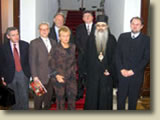 His
Grace Bishop Irinej of Backa met in the Bishop’s residence in
Novi Sad with members of a delegation of the European Parliament
headed by Mrs. Doris Pack, a deputy of the European Parliament
in charge of issues concerning respect for human rights and the
position of national minorities. His
Grace Bishop Irinej of Backa met in the Bishop’s residence in
Novi Sad with members of a delegation of the European Parliament
headed by Mrs. Doris Pack, a deputy of the European Parliament
in charge of issues concerning respect for human rights and the
position of national minorities.
The theme
of the meeting was the role and contribution of the Serbian Orthodox
Church to religious, cultural and multinational cooperation, as
well as the contribution of the Church to the prevention of multiethnic
conflicts in Vojvodina. Bishop Irinej welcomed Mrs. Pack and her
associates and expressed the readiness of the Church to assist
in the preservation and further building of good religious and
national relations in Vojvodina. His Grace emphasized that Vojvodina
is a unique model of cooperation between Churches and religious
communities in all areas of social life, giving as an example
of this cooperation the recently held conference on “The Contribution
of the Churches to Religious, Cultural and National Cooperation
on the Road to European Integration” jointly organized by the
Serbian Orthodox Diocese of Backa and the Roman Catholic Bishopric
of Subotica. Another example of cooperation between Churches and
religious communities cited by the Bishop was the work of the
Republic of Serbia Government Commission for Religious Instruction,
including representatives of the Ministry of Religions and the
Ministry of Education and Sports, as well as authorized representatives
of all traditional Churches and religious communities. The best
example of cooperation in this Commission, the Bishop underscored,
is the return of religious instruction to primary and secondary
schools in Serbia.
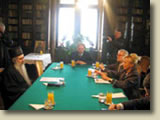 When
asked for his views on individual incidents that have occurred
in Vojvodina that have been portrayed to the public as national
conflicts, Bishop Irinej replied that these incidents were the
result of individual altercations and that certain events have
been exaggerated by the media while others have become the subjects
of media manipulation. “These incidents occurred as a result of
activities on the part of extremist individuals and groups of
from all nationalities living in this area. The Church, which
by its very nature is a community of love, by all means wishes
not only to establish a climate of good multiethnic and multiconfessional
relations and tolerance but far more than that; it wishes to establish
a relationship of mutual respect and love towards one’s neighbor.
We believe that the people will sooner listen to the voice of
the pastors in their Churches than the slogans of certain extremist
groups and individuals, or irresponsible local politicians,” emphasized
Bishop Irinej. At the end of the meeting, Mrs. Pack thanked the
Bishop on behalf of the delegation for the reception. Bishop Irinej
invited Mrs. Pack to attend the next Conference to be jointly
organized by the Diocese of Backa and the Bishopric of Subotica. When
asked for his views on individual incidents that have occurred
in Vojvodina that have been portrayed to the public as national
conflicts, Bishop Irinej replied that these incidents were the
result of individual altercations and that certain events have
been exaggerated by the media while others have become the subjects
of media manipulation. “These incidents occurred as a result of
activities on the part of extremist individuals and groups of
from all nationalities living in this area. The Church, which
by its very nature is a community of love, by all means wishes
not only to establish a climate of good multiethnic and multiconfessional
relations and tolerance but far more than that; it wishes to establish
a relationship of mutual respect and love towards one’s neighbor.
We believe that the people will sooner listen to the voice of
the pastors in their Churches than the slogans of certain extremist
groups and individuals, or irresponsible local politicians,” emphasized
Bishop Irinej. At the end of the meeting, Mrs. Pack thanked the
Bishop on behalf of the delegation for the reception. Bishop Irinej
invited Mrs. Pack to attend the next Conference to be jointly
organized by the Diocese of Backa and the Bishopric of Subotica.
Secretary
to the Bishop of Backa
Presbyter Vladan Simic

COMMUNIQUE
OF BISHOP FILARET OF MILESEVO
As in our
earlier communiques, we wish to inform the public regarding the
unfortunate incidents occurring in Prijepolje on January 28, 2005
in the interests of truth and justice.
On that day
at approximately 3:00 p.m. in the immediate vicinity of the Bishop’s
residence in Prijepolje from whence he was returning to his home
after performing his duties for the Bishop, Father Jovo Andan,
the elder of the church of Serbian Orthodox Church of St. Basil
of Ostrog, aged 28 years, was attacked.
A group of
five secondary school students, as the priest stated in his official
statement to an official of the Ministry of Internal Affairs in
Prijepolje, shouted behind him: BIG BLACK HEAD, TURN AROUND! They
repeated this three times and the priest logically concluded that
the taunt must have been addressed to him for there was no one
else nearby except for him and the students provoking him. This,
and of the intention of the students to provoke and attack the
priest without reason, was confirmed by the fact that the hoodlums
threw a snowball at him that narrowly missed, falling at the feet
of the priest. The priest was surprised by the incident.
By coincidence,
Zoran Stjepanovic, a policeman in uniform going home from work,
happened to be walking toward the priest and the students in Dusana
Tomasevica Cirka Street. The priest ran forward to meet him and
asked for his help.
After Father
Jovo informed him of what had happened, the policeman reacted
and asked the students their names but they acted arrogantly toward
him, appearing to be intoxicated. He managed to get a notebook
from the bag of one student and therefore concluded that he was
a minor and a student of the second year of the Economics Secondary
School in Prijepolje.
Father Jovo
Adnan gave an oral statement to representatives of the Ministry
of Internal Affairs in Prijepolje on January 28, 2005 at approximately
6:00 p.m. He gave an official statement to an authorized official
of the Ministry of Internal Affairs in Prijepolje on January 29,
2005.
Through further
investigation the Ministry of Internal Affairs obtained information
regarding all participants in the incident and has taken over
the handling of the whole case.
We, as the
Church, do not in the least blame the children for this incident,
provided it is not repeated, taking into account children’s prankishness;
however, we call upon their parents and teachers and urge them
to ask themselves where are their children, are they drinking
alcohol, are they perhaps taking drugs, how do they behave in
their homes and outside them? They need to peer at their childrens’
souls a little bit more instead of just counting them.
This is the
complete truth such as it is.
Any and all
media must not “create an incident” out of this, especially in
this environment which, as we all know, has its specific characteristics.
Father Jovo
Adnan was attacked in the manner we have described and documented;
he was not beaten, and the children involved in this misbehavior
need to be helped and counseled, not blamed for something they
did not do.
The Serbian
Orthodox Church and the Diocese of Milesevo once again, as always
in the past, calls on all people to live in peace and reiterates
that no incidents, including incidents such as this, should be
allowed to reoccur.
It is now
up to the authorities, the parents and all people of goodwill
because as the folk saying goes: resolve your small problems in
timely and effective fashion, lest you find yourself facing big
problems in the near future!
From
the office of the Diocese of Milesevo

ST
SAVA CELEBRATED IN SWEDISH CITY OF HELSINGBORG
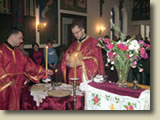 The
feast of St. Sava, the first Serbian Archbishop, was celebrated
most festively on Sunday, January 30, in the Swedish city of Helsingborg.
Protopresybter Dragan Predic served Holy Liturgy accompanied by
the chanting of the members of the children’s choir of our parish. The
feast of St. Sava, the first Serbian Archbishop, was celebrated
most festively on Sunday, January 30, in the Swedish city of Helsingborg.
Protopresybter Dragan Predic served Holy Liturgy accompanied by
the chanting of the members of the children’s choir of our parish.
A large number
of faithful filled our church but the detail deserving of the
greatest attention was the presence of a large number of small
children, which has not been the case in past years. Prota Dragan
has managed to unite the youth and the experience of the members
of the parish and the parish of St. Basil the Great in Helsingborg
has recently made great strides forward. In his sermon he called
on parents to be determined in the upbringing of their children
in the spirit of St. Sava, to speak the Serbian language in their
houses, and to teach their children the Cyrillic script. This
is the only approach that will ensure that their children will
not forget who they are and where they originate.
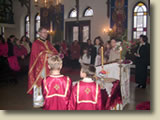 Divine
Liturgy finished with the cutting of the slava cake. Ms. Ivana
Popovic, born in Orasje near Varvarin, accepted the honor of being
the hostess of for next year. All the children present in the
church received packets of sweets prepared by the Circle of Serbian
Sisters in our parish for their students’ patron saint’s day. Divine
Liturgy finished with the cutting of the slava cake. Ms. Ivana
Popovic, born in Orasje near Varvarin, accepted the honor of being
the hostess of for next year. All the children present in the
church received packets of sweets prepared by the Circle of Serbian
Sisters in our parish for their students’ patron saint’s day.
A festal banquet
was prepared in the church hall followed by socializing and celebration
that lasted into the late afternoon hours.
Budimir
Kojic, vice-president of the parish of St. Basil the Great

CELEBRATION
OF ST SAVA IN SOUTH AFRICA
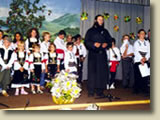 On
Saturday, January 29, 2005, St. Sava’s Day was festively celebrated
in the Serbian parish of Johannesburg. This great feast day is
also the patronal feast of the Serbian parish of St. Sava in South
Africa. The celebration began with a festal religious service
in the church of the Holy Apostle Thomas served by representatives
of the Romanian and Alexandrian Patriarchate, Father Michael and
Father Stephen, together with Hieromonk Panteleimon, the spiritual
father of the Serbs in South Africa. On
Saturday, January 29, 2005, St. Sava’s Day was festively celebrated
in the Serbian parish of Johannesburg. This great feast day is
also the patronal feast of the Serbian parish of St. Sava in South
Africa. The celebration began with a festal religious service
in the church of the Holy Apostle Thomas served by representatives
of the Romanian and Alexandrian Patriarchate, Father Michael and
Father Stephen, together with Hieromonk Panteleimon, the spiritual
father of the Serbs in South Africa.
After
the service, the celebration continued in the church hall where
Father Panteleimon addressed the gathered parishioners, who filled
the hall to the last seat, with words about the importance of
St. Sava for the Serbian Orthodox People and wished all present
a happy holiday and patronal feast with the prayerful wish that
in the future our people follows the path and knowledge of St.
Sava even more and with greater determination.
Then
children wearing folk costumes, a total of 25 of them, recited
poems about St. Sava before an enthusiastic audience that included
South African guests, as well as Greeks, Romanians, Bulgarians,
and Russians with their new priest, Father John.
After
the presentation by the children, Father Panteleimon cut the slava
cake and blessed the wheat with the hosts of the slava, Milenko
Jankovic from Pale and Branislav Nikolic from Sarajevo. All the
children in folk costumes helped to turn the slava cake with them.
According to our tradition, Miodrag Danilovic of Vrnjacka Banja
agreed to be the host of next year’s slava.
The
celebration was enhanced by the beautiful chanting of a choir
composed of Greeks and South Africans from the Orthodox Church
of St. Nicholas in Johannesburg. The Serbian community, although
far from its homeland, once again gathered on distant shores to
celebrate its greatest saint and to strengthen its ties to its
Church and place of origin.

CELEBRATION
OF ST SAVA IN ZAGREB
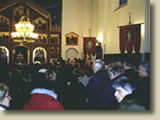 In
the Zagreb church of the Transfiguration of Our Lord the celebration
of St. Sava’s Day began on January 26, 2005 with a festal vespers
service served by His Eminence Metropolitan Jovan of Zagreb and
Ljubljana with the clergy of the Zagreb parishes. On the feast
of St. Sava itself Metropolitan Jovan served Holy Hierarchal Liturgy
with the concelebration of Protopresbyter-Stavrophor Marinko Juretic,
Protonamesnik Milenko Popovic, Presbyter Milan Topic, Presbyter
Dalibor Djukic and Deacon Aleksandar Obradovic. The church of
the Transfiguration was filled to the last seat, even though for
most Zagreb Serbs it was a working day. In
the Zagreb church of the Transfiguration of Our Lord the celebration
of St. Sava’s Day began on January 26, 2005 with a festal vespers
service served by His Eminence Metropolitan Jovan of Zagreb and
Ljubljana with the clergy of the Zagreb parishes. On the feast
of St. Sava itself Metropolitan Jovan served Holy Hierarchal Liturgy
with the concelebration of Protopresbyter-Stavrophor Marinko Juretic,
Protonamesnik Milenko Popovic, Presbyter Milan Topic, Presbyter
Dalibor Djukic and Deacon Aleksandar Obradovic. The church of
the Transfiguration was filled to the last seat, even though for
most Zagreb Serbs it was a working day.
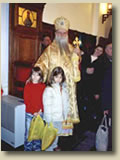 In
his sermon His Eminence the Metropolitan said: “In the name of
the Father, the Son and the Holy Spirit! Respect your teachers
who spoke the word of God to you and support their faith. Dear
brothers and sisters, the feast of St. Sava is one of the greatest
feasts in our Serbian Church. St. Sava is a great Hierarch of
the Church of God who came from the Nemanjic dynasty and who did
so much for his people and the founding of the Serbian Orthodox
Church, which during his enthronement became autonomous in 1219.
It is enough just to go the monastery of Zica, the former seat
of the Serbian church and state, the place where so many important
historical events occurred. The Pec Patriarchate, the monastery
of Studenica, the monastery of Chilandar and many other holy shrines
were build by rulers from the distinguished Nemanjic dynasty.
The life of the Nemanjices was life in accordance with the Lord,
and following the example of their venerable rulers, the entire
Serbian people lived accordance with Christ. Our teacher and enlightener,
Holy Father Sava, become renowned for his spiritual accomplishments,
first and foremost, during the course of his monastic life, and
later, as the elder of Chilandar Monastery, and ultimately as
the first Serbian Archbishop. On Athos in the garden of the Theotokos,
St. Sava had opportunity to see the greatest religious and cultural
achievements, to retreat to the Karyes Hermitage, to translate
and to write the Karyes, Chilandar and Studenica Typicon. He journeyed
throughout the Holy Land and worshipped in the greatest Christian
holy shrines, as the epic poet and narrator described in the songs
and stories of the life and works of St. Sava. Glory to God and
St. Sava that we have lived to see the day that the St. Sava Memorial
Cathedral in Vracar (Belgrade) has been completed, and that such
a monumental holy shrine now stands in the holy place where his
holy relics were burned. May God and Holy Sava grant that this
church becomes a great spring and wave of Divine blessing. Help
us, St. Sava, that from all our churches the evangelical waters
of eternity may flow and that led by you we all live in God-pleasing
manner, celebrating the Father, the Son and the Holy Spirit. Amen.” In
his sermon His Eminence the Metropolitan said: “In the name of
the Father, the Son and the Holy Spirit! Respect your teachers
who spoke the word of God to you and support their faith. Dear
brothers and sisters, the feast of St. Sava is one of the greatest
feasts in our Serbian Church. St. Sava is a great Hierarch of
the Church of God who came from the Nemanjic dynasty and who did
so much for his people and the founding of the Serbian Orthodox
Church, which during his enthronement became autonomous in 1219.
It is enough just to go the monastery of Zica, the former seat
of the Serbian church and state, the place where so many important
historical events occurred. The Pec Patriarchate, the monastery
of Studenica, the monastery of Chilandar and many other holy shrines
were build by rulers from the distinguished Nemanjic dynasty.
The life of the Nemanjices was life in accordance with the Lord,
and following the example of their venerable rulers, the entire
Serbian people lived accordance with Christ. Our teacher and enlightener,
Holy Father Sava, become renowned for his spiritual accomplishments,
first and foremost, during the course of his monastic life, and
later, as the elder of Chilandar Monastery, and ultimately as
the first Serbian Archbishop. On Athos in the garden of the Theotokos,
St. Sava had opportunity to see the greatest religious and cultural
achievements, to retreat to the Karyes Hermitage, to translate
and to write the Karyes, Chilandar and Studenica Typicon. He journeyed
throughout the Holy Land and worshipped in the greatest Christian
holy shrines, as the epic poet and narrator described in the songs
and stories of the life and works of St. Sava. Glory to God and
St. Sava that we have lived to see the day that the St. Sava Memorial
Cathedral in Vracar (Belgrade) has been completed, and that such
a monumental holy shrine now stands in the holy place where his
holy relics were burned. May God and Holy Sava grant that this
church becomes a great spring and wave of Divine blessing. Help
us, St. Sava, that from all our churches the evangelical waters
of eternity may flow and that led by you we all live in God-pleasing
manner, celebrating the Father, the Son and the Holy Spirit. Amen.”
At
the end of the Liturgy the slava cake was cut and the Serbian
children who attend religious instruction presented a St. Sava’s
Day program. The St. Sava’s Day celebration was enhanced by the
consecration of a new hall in the building of the church parish
of Zagreb at Preobrazenjska Street 2/1. The church parish of Zagreb
prepared suitable gifts for all children who came to celebrate
their own patron, St. Sava.

[Serbian
Translation Services]
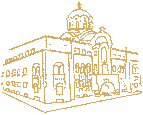
Copyright © 1999-2004 by
The Information Service of the Serbian Orthodox Church
11000 Belgrade
Kralja Petra I no.5
+381 11 3282 596
e-mail
|

